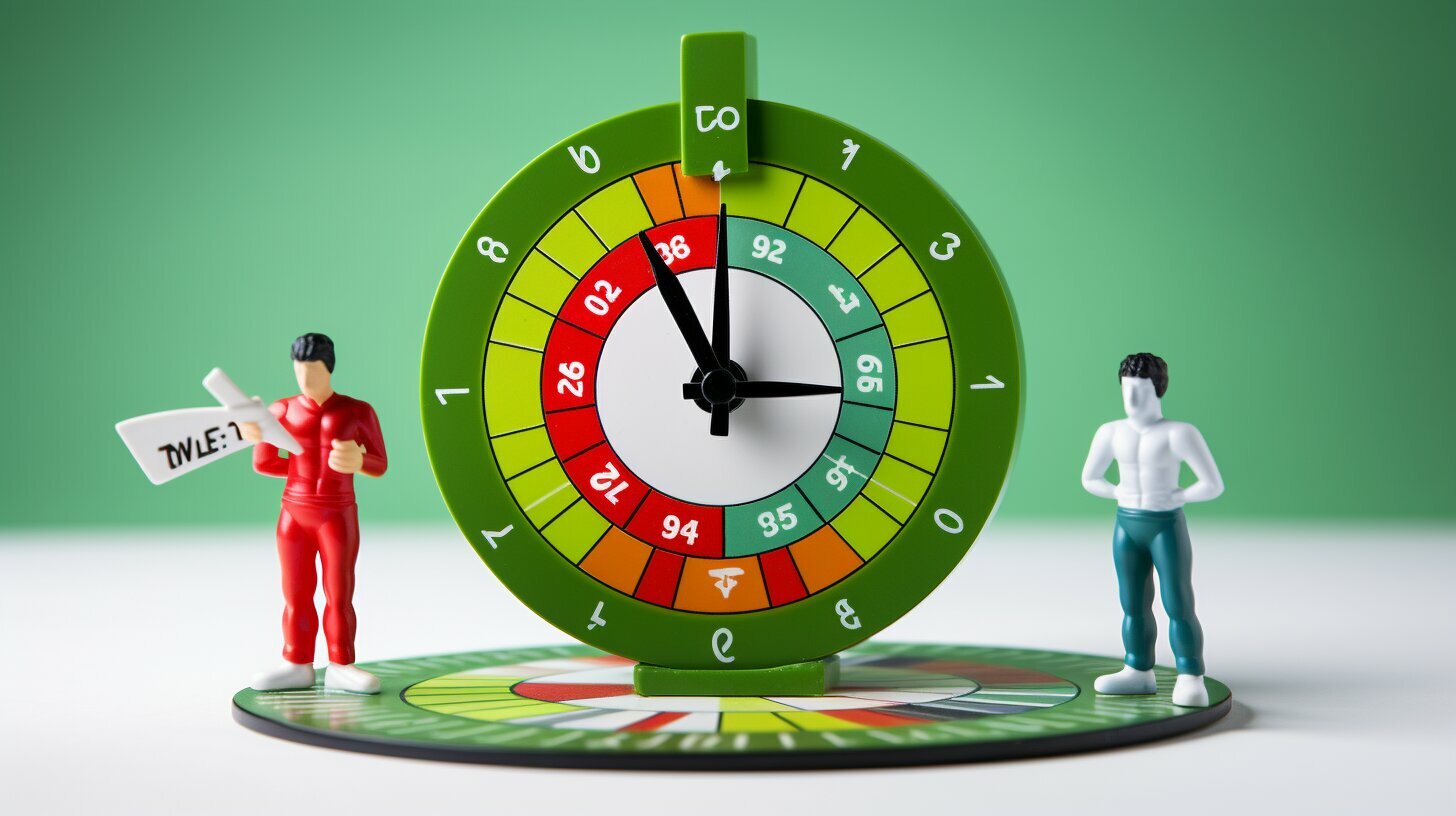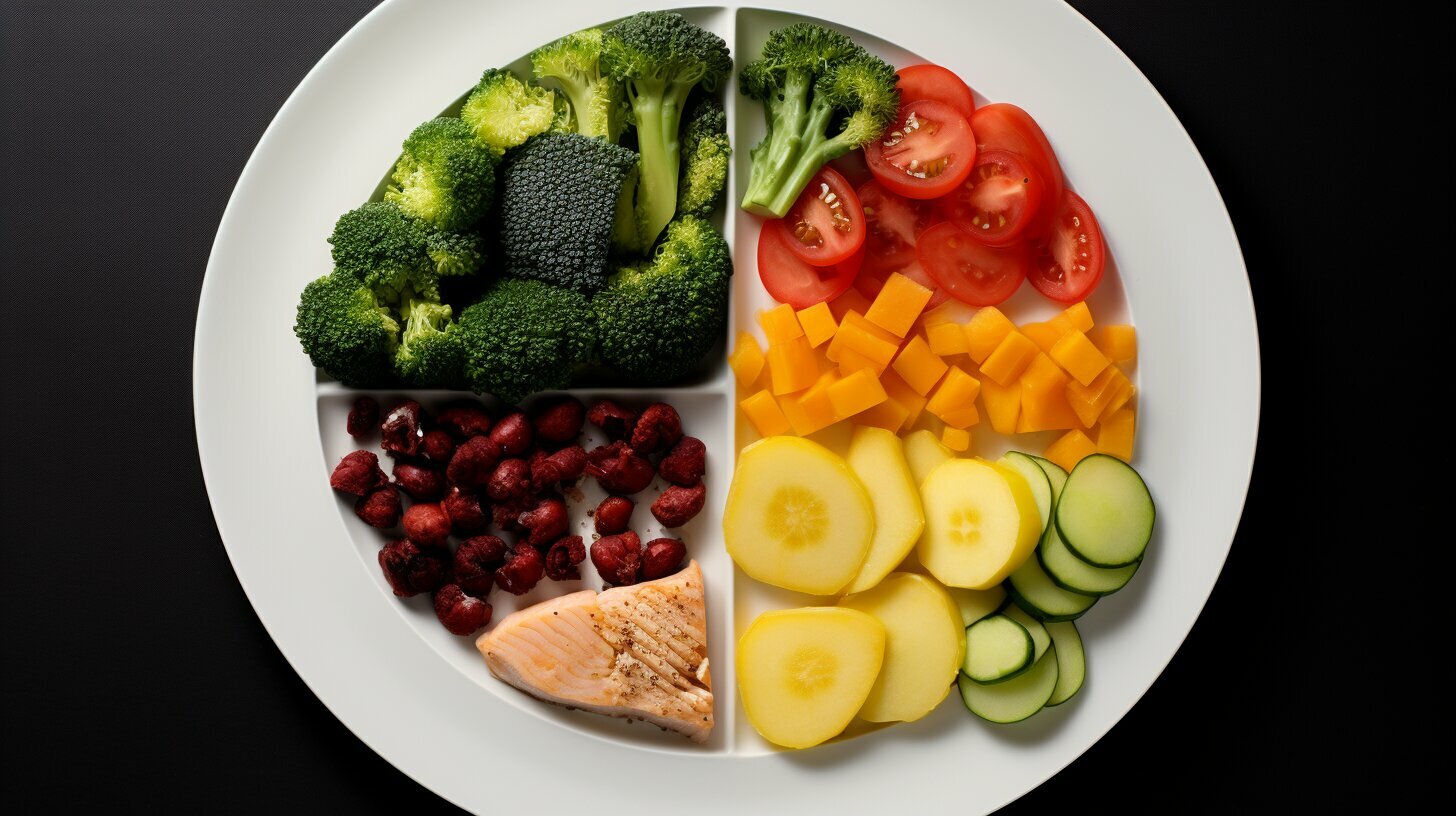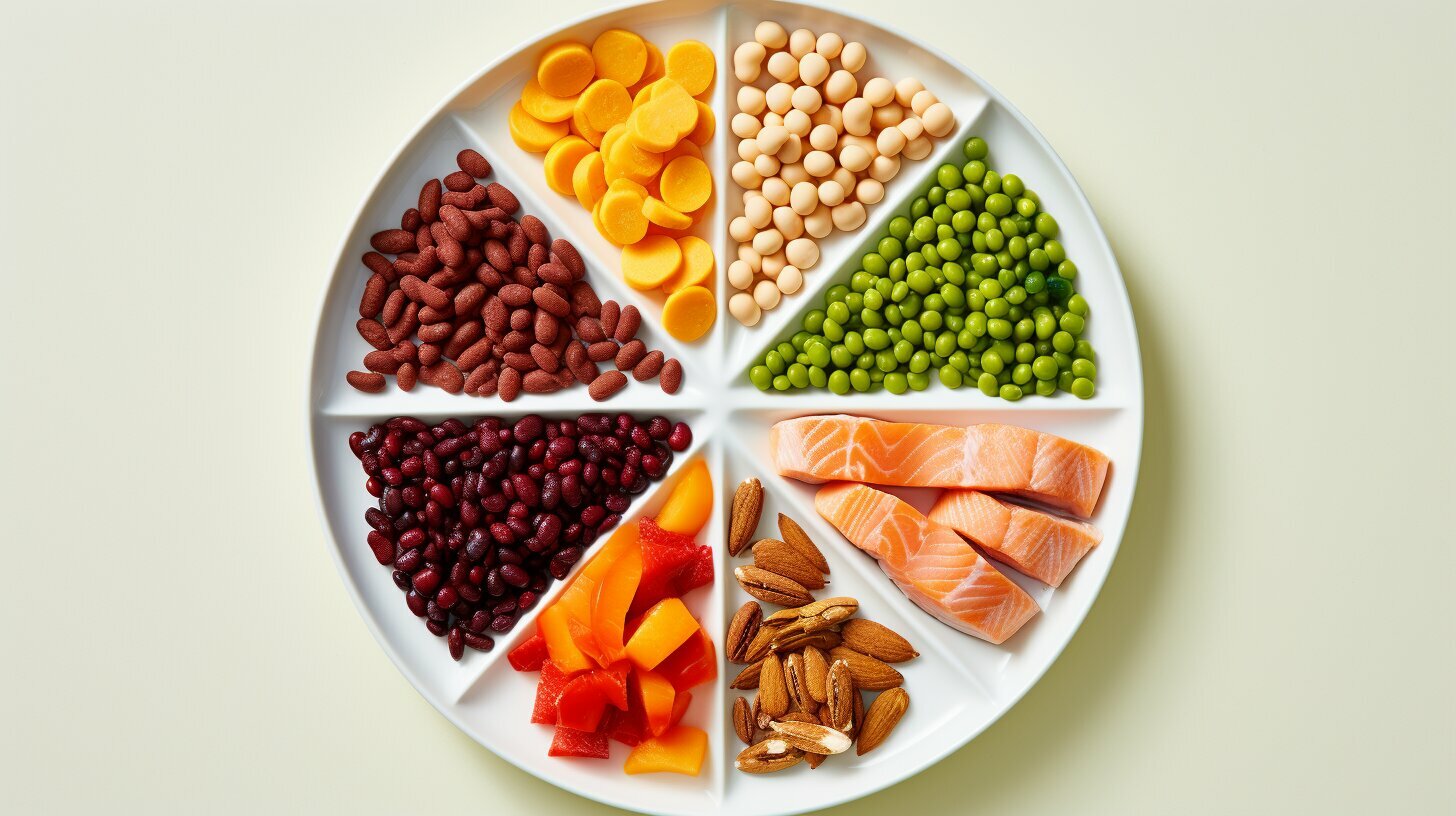5 Tips for Weight Loss
Welcome to our guide on 5 tips for weight loss. Losing weight can be a challenge, but with the right strategies, it's absolutely achievable. Whether you're trying to lose a few pounds or make a significant lifestyle change, our expert tips can help you get there.
In this section, we'll explore five tips that are best for fat loss and a healthy diet. These tips cover various aspects, from diet to exercise to lifestyle changes. By implementing these tips, you can improve your chances of shedding those extra pounds and achieving a healthier, happier you.
- Weight loss is achievable with the right strategies.
- Creating a balanced and nutritious meal plan is essential for weight loss.
- Incorporating regular exercise and prioritizing protein intake can aid in fat loss.
- Stress management and quality sleep are crucial for overall well-being and weight loss.
- Tracking your progress can help you stay motivated and make necessary adjustments.
Set Realistic Goals
If you're looking to lose weight, it's essential to set realistic goals that you can achieve over time. Remember that weight loss is a gradual process that requires patience and dedication.
Setting achievable and specific goals can help you stay motivated and on track towards your weight loss target. By tracking your progress, you can adjust your diet and exercise regimen as needed and celebrate small wins along the way.
When setting goals, make sure they are realistic for your body type, lifestyle, and preferences. For example, if you're not a morning person, committing to an early morning workout routine may not be sustainable in the long run.
Remember that weight loss isn't just about the number on the scale. It's also about improving your overall health and well-being. Focus on establishing healthy habits that you can maintain in the long term, rather than pursuing rapid weight loss that may not be sustainable.
Here are some examples of specific and achievable weight loss goals:
- Walk briskly for 30 minutes, five days a week
- Reduce daily calorie intake by 500 calories
- Eat five servings of fruits and vegetables daily
- Drink eight glasses of water daily
- Limit processed and high-fat foods to once a week
By setting realistic goals and focusing on healthy habits, you can achieve successful weight loss that is sustainable in the long run.

Achieving weight loss through a well-balanced and nutritious diet is crucial. To create a meal plan that promotes weight loss, it is essential to focus on nutrient-dense foods that are low in calories and rich in fiber.
Start by setting a calorie goal for yourself, which will serve as a guideline for your daily food intake. Next, aim to include a variety of nutrient-rich foods, including lean protein sources, whole grains, fruits, and vegetables. These foods will provide your body with the necessary nutrients while keeping you feeling full and satisfied.
It is also important to limit your intake of processed foods and added sugars, as they are often high in calories and low in nutrients. Try to opt for whole, unprocessed foods whenever possible.
Lastly, don't forget to stay hydrated by drinking plenty of water throughout the day. Drinking enough water can help keep you feeling full and prevent overeating.
By creating a balanced and nutritious meal plan, you can lose weight and improve your overall health. Remember to focus on nutrient-dense foods, limit processed foods and added sugars, and stay hydrated. With time and effort, you can achieve your weight loss goals and maintain a healthy lifestyle.
Incorporate Regular Exercise
Regular exercise is an essential component of any weight loss plan. It not only burns calories but also helps to build muscle, which in turn increases metabolism and promotes fat loss.
When starting an exercise routine, it is important to start slowly and gradually increase the intensity and duration over time. This will help prevent injury and ensure that the exercise routine is sustainable.
The best exercises for weight loss include cardiovascular exercises such as running, cycling, and swimming, as well as strength training exercises like weight lifting and bodyweight exercises.
It's important to find exercises that you enjoy, as this will increase your likelihood of sticking with the routine. Additionally, incorporating physical activity into your daily routine, such as taking the stairs instead of the elevator and walking instead of driving, can also help promote weight loss.
Remember, exercise is just one component of weight loss. Incorporating a balanced diet and making lifestyle changes is also crucial. By combining all of these elements, you can achieve successful and sustainable weight loss.
Prioritize Protein Intake
Protein is an important nutrient that plays a crucial role in weight loss and muscle preservation. When you are trying to lose weight, your body may start breaking down muscle tissue for energy instead of burning fat. Prioritizing protein intake can help prevent this from happening.
Studies have shown that increasing protein intake can boost metabolism, reduce appetite, and promote feelings of fullness. This can lead to consuming fewer calories, ultimately resulting in weight loss and fat loss.
| Examples of protein-rich foods include: | Protein content per serving: |
|---|---|
| Chicken breast | 24 g |
| Greek yogurt | 17 g |
| Eggs | 6 g per egg |
| Tuna | 22 g |
When incorporating protein into your diet, aim for lean sources of protein and try to include it in every meal. This can also help prevent overeating and cravings throughout the day.
It's important to remember to balance your protein intake with other nutrients, such as healthy fats and carbohydrates, for optimal health and weight loss. Consulting with a registered dietitian can also help you create a personalized and effective diet plan.
Proper hydration is crucial for successful weight loss. Dehydration can lead to water retention, which can make you feel bloated and hinder your weight loss progress. Moreover, drinking enough water can help you feel full and reduce your urge to snack unnecessarily.
For optimal weight loss, aim to drink at least eight glasses of water per day. Keep a water bottle with you at all times and sip on it throughout the day. You can also add sliced fruits or herbs to your water for extra flavor.
Keep in mind that other beverages, such as coffee and soda, can dehydrate you, so it's best to limit your intake of these drinks. If you're not a fan of plain water, you can also drink herbal tea or coconut water for hydration.
In addition to aiding in weight loss, staying hydrated has many other health benefits. Proper hydration can improve your skin health, boost your metabolism, and even reduce your risk of kidney stones.
So, make sure to prioritize hydration as a part of your weight loss journey. Drink plenty of water, limit your intake of dehydrating beverages, and track your water intake to ensure you're getting enough.
Manage Stress Levels
Stress is a common factor that can hinder your weight loss journey. It's important to manage stress levels to promote emotional well-being and maintain a healthy body weight.
One effective stress management technique is deep breathing and meditation. Taking a few deep breaths and focusing your mind on the present moment can help to calm your mind and reduce stress levels. Another useful technique is to engage in physical activities such as yoga or tai chi, which promote relaxation and reduce stress.
It's also important to identify the sources of stress in your life and take steps to manage them. This may involve reducing your workload, setting realistic goals, or seeking support from friends and family.
Remember, stress management is an ongoing process, and it may take time to find the right techniques that work for you. But by prioritizing stress management, you can improve your overall well-being and increase your chances of successful weight loss.
Don't let stress hold you back from achieving your weight loss goals. Start practicing stress management techniques today and see the positive impact it can have on your life!
Get Quality Sleep
Quality sleep is crucial for weight loss because it affects the hormones that regulate hunger and metabolism. Not getting enough sleep can cause an increase in the hormone ghrelin, which stimulates hunger, and a decrease in the hormone leptin, which signals fullness.
To improve your sleep quality, create a consistent sleep schedule, avoid caffeine and alcohol before bed, and create a comfortable sleep environment. Try to get at least 7-8 hours of sleep per night.
In addition to improving hormone regulation, quality sleep can also have a positive impact on exercise performance, making it easier to stick to a workout routine and burn more calories during exercise.
One way to promote better sleep is to establish a relaxing bedtime routine. This can include activities such as reading, taking a warm bath, or practicing relaxation techniques like meditation or deep breathing.
Image for Get Quality Sleep Section
Track Your Progress
Tracking your progress is crucial to ensure that you are on the right track to achieve your weight loss goals. Keeping a record of your progress can help you stay motivated and make necessary adjustments to your diet and exercise routine.
One effective way to track your progress is by measuring your body weight regularly. You can also take measurements of your waist, hips, and other body parts to see changes in your body composition. Another useful tool is taking progress pictures to visually compare your body changes.
It is important to choose a tracking method that works best for you. Whether it is using a mobile app, a spreadsheet, or a paper journal, make sure to use it consistently. Set milestones to review your progress and celebrate your achievements along the way.
Remember that weight loss is not an overnight process, and progress takes time. Consistency and perseverance are key to achieving your goals. Tracking your progress can help you stay accountable and motivated throughout your weight loss journey.
Conclusion
Weight loss can be a challenging journey, but implementing these five tips can greatly enhance your chances of success. By setting realistic goals, creating a balanced and nutritious meal plan, incorporating regular exercise, prioritizing protein intake, staying hydrated, managing stress levels, getting quality sleep, and tracking your progress, you are on the right track towards achieving your weight loss goals.
Remember, the best approach for fat loss is a healthy and sustainable diet combined with regular exercise and a healthy lifestyle. Don’t fall for quick-fix solutions or fad diets that promise overnight results. Instead, make long-term lifestyle changes that will help you achieve and maintain a healthy weight.
It’s important to note that every person’s weight loss journey is unique, and it’s crucial to consult with a healthcare professional before making any significant changes to your diet or exercise routine. With patience, persistence, and determination, you can achieve your weight loss goals and lead a healthier, happier life!
FAQ
Q: What are some tips for weight loss?
A: Here are five tips for weight loss: setting realistic goals, creating a balanced and nutritious meal plan, incorporating regular exercise, prioritizing protein intake, staying hydrated, managing stress levels, getting quality sleep, and tracking your progress.
Q: Why is setting realistic goals important for weight loss?
A: Setting realistic goals is crucial for staying motivated and tracking your progress effectively. It allows you to establish achievable targets and measure your success along the way.
Q: How can I create a balanced and nutritious meal plan for weight loss?
A: To create a balanced and nutritious meal plan, focus on including a variety of fruits, vegetables, lean proteins, whole grains, and healthy fats. Portion control and mindful eating are also essential.
Q: What are the best exercises for fat loss?
A: The best exercises for fat loss include cardiovascular exercises like running, cycling, and swimming, as well as strength training exercises that help build lean muscle mass.
Q: Why is protein intake important for weight loss?
A: Protein helps promote satiety, preserve lean muscle mass, and support fat loss. Including sources of lean protein, such as poultry, fish, beans, and tofu, in your diet can aid in weight loss.
Q: How much water should I drink for weight loss?
A: Staying hydrated is important for weight loss. Aim to drink at least 8 cups (64 ounces) of water per day, but individual needs may vary.
Q: What are some effective stress management techniques for weight loss?
A: Effective stress management techniques for weight loss include practicing mindfulness, engaging in regular physical activity, getting enough sleep, and seeking support from friends, family, or professionals.
Q: How does sleep quality affect weight loss?
A: Quality sleep plays a crucial role in weight loss. Poor sleep can disrupt hormonal balance, increase cravings for unhealthy foods, and negatively affect metabolism. Aim for 7-9 hours of uninterrupted sleep each night.
Q: How can I track my progress during weight loss?
A: There are several ways to track your weight loss progress, such as keeping a food and exercise journal, using a fitness tracker, taking body measurements, or regularly weighing yourself. Find the method that works best for you.









